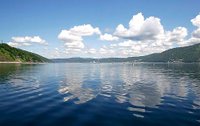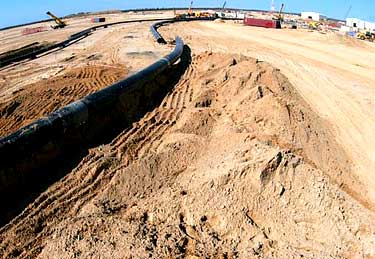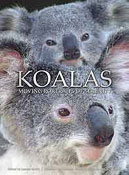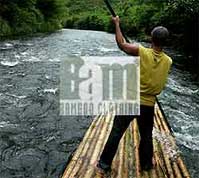Lake Biakal pipeline
Located in southeastern Siberia, Lake Baikal is the world's oldest lake (about 25 million years) and its deepest (5,315 ft or 1,620 m.) Baikal contains a huge volume of water, more than that held by all the American Great Lakes combined, over 20% of the world's fresh water. Nearly 400 miles in length and, at its widest point, over 50 miles across, Lake Baikal transects some of the world's most pristine natural terrain and some of the most geologically unstable. Scientists, who are monitoring the seismic shifts that steadily tear the region apart, say that Baikal is becoming an ocean. The region is growing apart at the rate of over 2cm per year. Scientists say nothing, therefore, can protect the pipeline from the frequent earthquakes that strike the area.
 For over a century the only reliable transportation through the area has been the infamous Trans-Siberian Railway however now, that is about to end.
For over a century the only reliable transportation through the area has been the infamous Trans-Siberian Railway however now, that is about to end.
International energy giant, Lukoil and the Russian, State owned pipeline conglomerate, Transneft are about to undertake a massive 10 year construction project that would span the region with a 2597 mile (4,188 kilometers)long Siberian Pacific pipeline. The above ground transportation line with its attendant network of thirty-two pumping stations and nineteen tank farms is being built in order to convey oil from Russia's western fields to the east coast and Pacific ports north of Japan. The system, it is estimated will transport over 2 million tons of oil and associate product per week when fully operational.
The largest oil consumers in the region are China, Japan, South Korea, India, Indonesia and Australia. According to forecasts, consumption of oil and oil based products in the area will increase to 1510 million tons by 2010, 1970 million tons by 2020 and to over 2200 million tons by the year 2030.
Designated by UNESCO a World Heritage Site in 1996, the Baikal Lake region is considered by conservationists and environmentalists one of the world's most sensitive environments. Dozens of rare plant and animal species exist only in this high plateau tundra including the Amur leopard, probably the world's rarest big cat - its total population is estimated at just 30 individuals - and the Nerpa or Baikal seal (a.k.a., phoca sibirica). This is the only species of seal that lives exclusively in fresh water.
 The pipe route will cross the largest river of the Baikal basin - Verkhnya Angara River. A rupture of the pipeline and pollution of this river will eventually result in the pollution of Lake Baikal itself. The route also crosses the Amur River, upstream of the Khbarovsk - the only water intake for a city with a population of million people.
The pipe route will cross the largest river of the Baikal basin - Verkhnya Angara River. A rupture of the pipeline and pollution of this river will eventually result in the pollution of Lake Baikal itself. The route also crosses the Amur River, upstream of the Khbarovsk - the only water intake for a city with a population of million people.
 In October 2005, Russian President Putin berated the country's works ministers for unreasonable delays in the coordination of the pipeline project. He further criticized Russian environmentalists for creating obstacles for Russia's economic development. Mr. Putin blamed non-government organizations of accepting financial aid from "competitors," specifically citing the Siberia-Pacific Pipeline Project (see enlarged map for detail). However, NGOs argue that their only interest is for a changed pipeline route, not for cancellation of the entire project.
In October 2005, Russian President Putin berated the country's works ministers for unreasonable delays in the coordination of the pipeline project. He further criticized Russian environmentalists for creating obstacles for Russia's economic development. Mr. Putin blamed non-government organizations of accepting financial aid from "competitors," specifically citing the Siberia-Pacific Pipeline Project (see enlarged map for detail). However, NGOs argue that their only interest is for a changed pipeline route, not for cancellation of the entire project.
Now, as pressure to supply a growing Asian demand for oil increases, Russian political and econonomic considerations threaten to permanently scar not just a land rich in natural resource but a land that would be key to a continent's changing face.
by Harlan Weikle
Greener Magazine
 For over a century the only reliable transportation through the area has been the infamous Trans-Siberian Railway however now, that is about to end.
For over a century the only reliable transportation through the area has been the infamous Trans-Siberian Railway however now, that is about to end.International energy giant, Lukoil and the Russian, State owned pipeline conglomerate, Transneft are about to undertake a massive 10 year construction project that would span the region with a 2597 mile (4,188 kilometers)long Siberian Pacific pipeline. The above ground transportation line with its attendant network of thirty-two pumping stations and nineteen tank farms is being built in order to convey oil from Russia's western fields to the east coast and Pacific ports north of Japan. The system, it is estimated will transport over 2 million tons of oil and associate product per week when fully operational.
The largest oil consumers in the region are China, Japan, South Korea, India, Indonesia and Australia. According to forecasts, consumption of oil and oil based products in the area will increase to 1510 million tons by 2010, 1970 million tons by 2020 and to over 2200 million tons by the year 2030.
Designated by UNESCO a World Heritage Site in 1996, the Baikal Lake region is considered by conservationists and environmentalists one of the world's most sensitive environments. Dozens of rare plant and animal species exist only in this high plateau tundra including the Amur leopard, probably the world's rarest big cat - its total population is estimated at just 30 individuals - and the Nerpa or Baikal seal (a.k.a., phoca sibirica). This is the only species of seal that lives exclusively in fresh water.
 The pipe route will cross the largest river of the Baikal basin - Verkhnya Angara River. A rupture of the pipeline and pollution of this river will eventually result in the pollution of Lake Baikal itself. The route also crosses the Amur River, upstream of the Khbarovsk - the only water intake for a city with a population of million people.
The pipe route will cross the largest river of the Baikal basin - Verkhnya Angara River. A rupture of the pipeline and pollution of this river will eventually result in the pollution of Lake Baikal itself. The route also crosses the Amur River, upstream of the Khbarovsk - the only water intake for a city with a population of million people. In October 2005, Russian President Putin berated the country's works ministers for unreasonable delays in the coordination of the pipeline project. He further criticized Russian environmentalists for creating obstacles for Russia's economic development. Mr. Putin blamed non-government organizations of accepting financial aid from "competitors," specifically citing the Siberia-Pacific Pipeline Project (see enlarged map for detail). However, NGOs argue that their only interest is for a changed pipeline route, not for cancellation of the entire project.
In October 2005, Russian President Putin berated the country's works ministers for unreasonable delays in the coordination of the pipeline project. He further criticized Russian environmentalists for creating obstacles for Russia's economic development. Mr. Putin blamed non-government organizations of accepting financial aid from "competitors," specifically citing the Siberia-Pacific Pipeline Project (see enlarged map for detail). However, NGOs argue that their only interest is for a changed pipeline route, not for cancellation of the entire project.Now, as pressure to supply a growing Asian demand for oil increases, Russian political and econonomic considerations threaten to permanently scar not just a land rich in natural resource but a land that would be key to a continent's changing face.
by Harlan Weikle
Greener Magazine



11:59 AM









<< Home